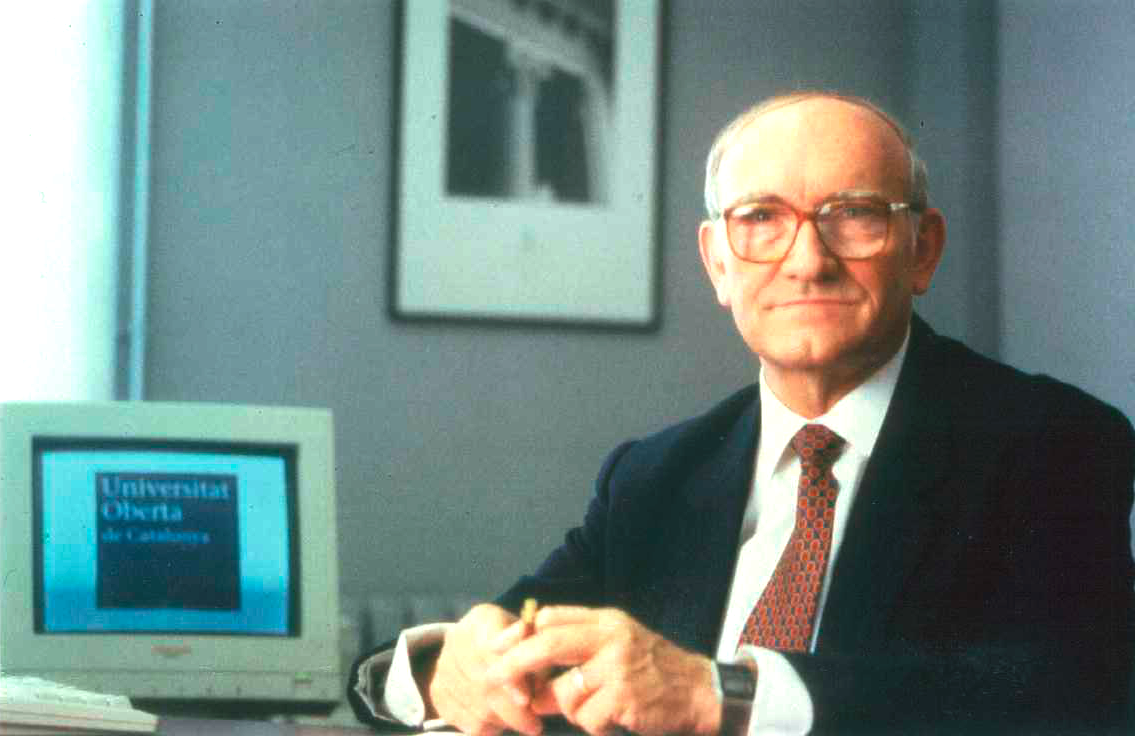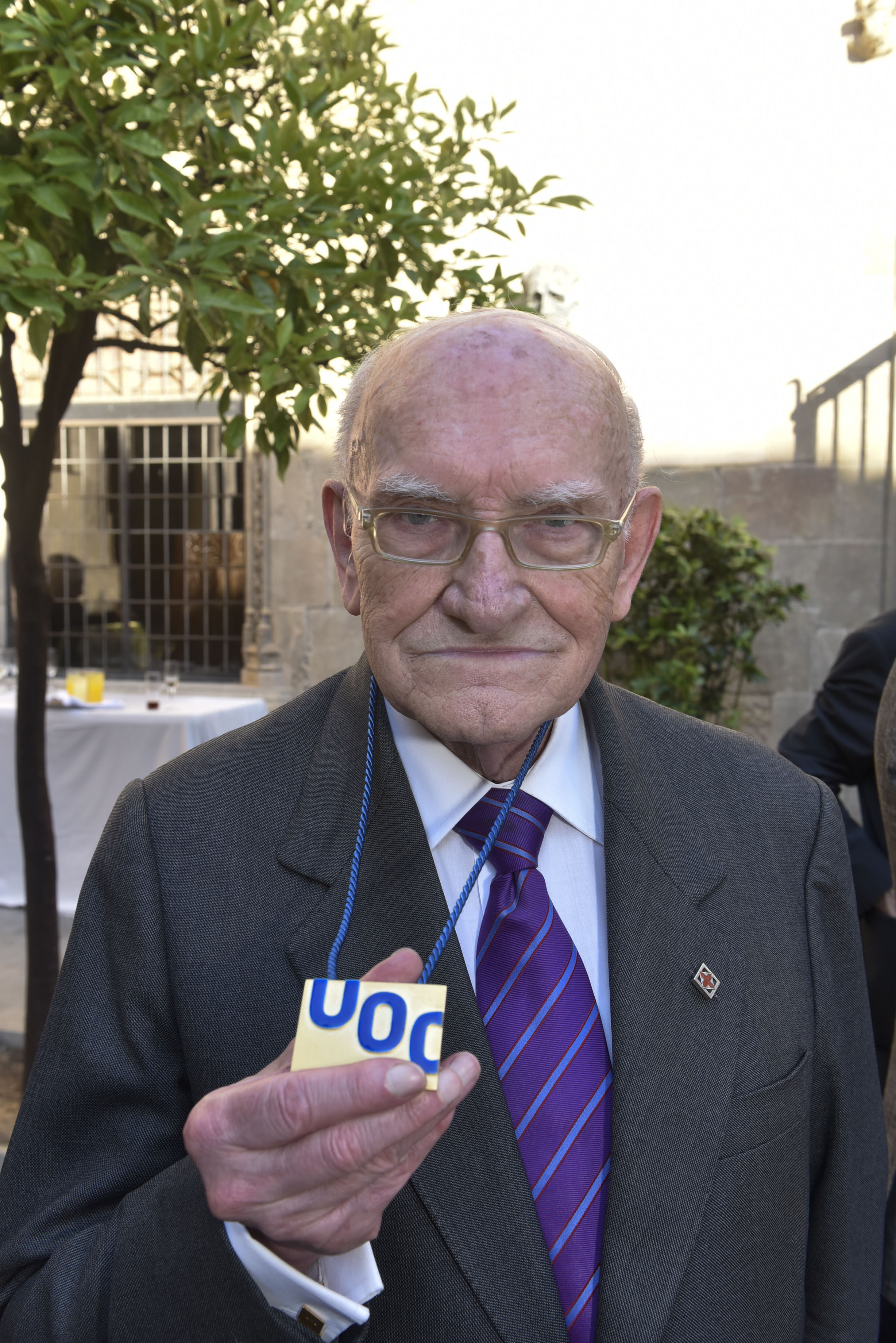Gabriel Ferraté, wise visionary and founder of the world's first online university
The founder and first president of the UOC has died aged 91
Gabriel Ferraté i Pascual (born in Reus, 1932), who has died aged 91, will live on in our memories as a visionary, dynamic, affable and innovative spirit. Encouraged by his family to seek new discoveries and keep learning continually, he was a well-educated and well-travelled man. He spoke many languages – Catalan, Spanish, English, French and German –, living in France during an early period of his life and later studying in London. As a child, he would constantly be putting things together and taking them apart; indeed, in his youth he managed to build both a printer and a photocopier.
That restless youngster would go on to qualify as an industrial engineer and agricultural technical assessor. His father, who was in the wine business, wanted him to continue the family trade, but Gabriel preferred to focus his career and his scientific and investigative interests on computer science, automation and robotics; in the end, however, the field where he made his greatest impact was education. "The world that motivated me most was the world of teaching and learning," he acknowledged.
He earned the rank of full professor of automatic control at the Barcelona School of Industrial Engineering where he went on to become director from 1969 to 1972. It was a time when, under Franco's dictatorship, tensions in society were spilling over, and Ferraté frequently had to go to the police station for the release of students who had been detained while demonstrating.
In 1972 he began a lengthy spell as rector of the Universitat Politècnica de Catalunya (UPC), a highlight of which was the creation of its North Campus. He continued in this position until 1994, leading the institution for over two decades, albeit with a break between 1976 and 1978, when he went to work in Madrid, first as Director General of Universities and Research and then as Director General of Scientific Policy in the Ministry of Education. He later explained that this was the most challenging time in his career as, with the country just emerging from the dictatorship, he had to answer to both the minister and the police.
A special assignment
Those achievements marked an outstanding career, but his greatest was yet to come: the foundation of the Universitat Oberta de Catalunya (UOC). In 2011, aged 78, when Ferraté gave Walk In an interview – to which he turned up on a high power motorcycle, proudly showing off his gleaming new iPad – he told the story of the historic meeting he had with Josep Laporte (then Catalonia's minister for education) on 13 December 1993. "He explained they had been talking to the Spanish National University for Distance Education (UNED) about some of the teaching being done in Catalan, but that in the end the faculty was opposed to it. The president of the Catalan government, Pujol, decided to create Catalonia's own distance learning university and asked Laporte to discuss it with me. At that time, I only had a few months left as rector of the UPC. I told him I’d think about it and after a few days I accepted, but with one small condition: that they would trust me and let me create a different university from those of the past. It's a miracle if a politician lets you do something different, because it always frightens them. But they said yes. It had to be a new university, different from the others," he recalled.
The initial meetings, early in 1994, were secret and held in the evening or into the night, in Gabriel's office or at his home. There they discussed ideas for what shape the new university and its academic and administrative systems would take. "We had some inspired minds among us, thinking out how it should be," he described. A few years back, upon the passing of Josep Laporte, Claudi Alsina, who was one of those visionary thinkers and the UOC's first Vice President for Faculty and Academic Affairs, wrote a blog post remembering those early moments (The UOC and three springtime evenings in 1994 [CA]).
His most creative period
This was how the world's first online university came into being and how the concept of a virtual campus was invented (originally in black and white). "We wanted to use new technology to break the barriers of time and space," Ferraté said. But it was not easy. There was no example to base it on and the internet was at a very early stage in its development. "You have to remember, not many people were able to use the internet yet! The World Wide Web still didn't exist! Computers needed a special program installed in order to connect to each other," he explained.
Ferraté travelled all around Catalonia to explain to town halls and the public what the UOC was about, a frenetic activity that was well received. This innovative idea encountered no resistance from the rectors and presidents of other universities, who did not expect it to amount to much. "For someone to say they'd set up a university in which all the students would have a computer through which they'd connect in a virtual network seemed a pipe dream at that time. People looked at me as if I were nuts," he told Walk In.
It was also Ferraté who gave the new institution its name, Universitat Oberta de Catalunya, influenced by the Open University, the UK's prestigious distance learning institution. "The term distance has a negative connotation. Distance separates. We never thought of calling it a distance university. We called it the universitat oberta, and our initial slogan was the university without distances," he recalled.
"In truth", he reflected, "it was the most creative period of my life." This visionary soul did not only hatch the idea of the UOC, which began operating in 1995, but was also its first president. In its pilot academic year, the UOC had 200 students enrolled on its two programmes (Business Science and Educational Psychology). By the end of his presidency, ten years later in 2005, there were 38,300 students. Now the UOC has 87,500 students, whose options include 26 bachelor's degrees, 53 university master's degrees and a wide range of other programmes. The website commemorating the UOC's 25th anniversary covers key milestones from this period.
Active in many fields
A methodical worker, effective communicator and collector of books – on Catalonia and its past but particularly poetry books, of which he had more than 6,000 –, Ferraté was a multidisciplinary professional. He was director of the Cybernetics Institute, Vice President of the Interdepartmental Council of Research and Technological Innovation, President of Caixa Tarragona savings bank, Vice President of Catalunya Caixa savings bank, President of the Cerdà Institute and of Catalonia's Advisory Board for Sustainable Development, and organizer of the Sòcrates Educa project. Furthermore, he was a member of the executive committee of the International Federation of Automatic Control (IFAC), of the Institute of Catalan Studies, of the board of trustees of the Foundation for the Catalan Encyclopaedia, of the Medical Sciences Academy of Catalonia and the Balearic Islands, of the Barcelona Royal Academy of Sciences and Arts, and of Reus Reading Centre.
Recognition from universities
In 2010, in recognition of his invaluable contributions in the sphere of education, the UPC and the UOC set up an institutional alliance to tackle social problems through the President Gabriel Ferraté Award. The University of Lleida and the Technical University of Madrid also paid homage to his work, bestowing honorary doctorates upon him, and in 1996 he was awarded Catalonia's Cross of Sant Jordi.
In 2018 Ferraté was awarded the UOC medal of honour in a ceremony at the Palau de la Generalitat. Àngels Doñate, former UOC head of press, interviewed him at the time, and he defined himself as an optimist ("it's scientifically proven that things work out better for optimists") and a good listener ("it's better to know how to listen and know what others think than to know the truth and pontificate"). However, many who knew his personal qualities first-hand will think of him in less modest terms, remembering him as a wise visionary and the founder of the world's first online university.
Press contact
-
Anna Torres Garrote

